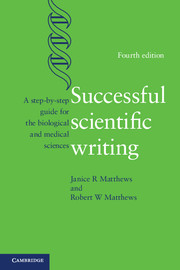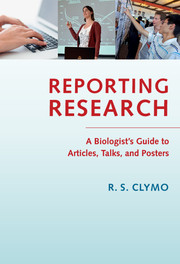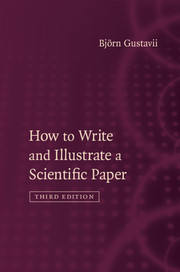Successful Scientific Writing
A Step-by-Step Guide for the Biological and Medical Sciences
4th Edition
$42.99 (P)
- Authors:
- Janice R. Matthews, Scientific Editing Services
- Robert W. Matthews, University of Georgia
- Date Published: December 2014
- availability: Available
- format: Paperback
- isbn: 9781107691933
$
42.99
(P)
Paperback
Other available formats:
eBook
Looking for an examination copy?
If you are interested in the title for your course we can consider offering an examination copy. To register your interest please contact [email protected] providing details of the course you are teaching.
-
Thoroughly revised and updated, the new edition of this acclaimed and best-selling guide offers a rich blend of practical advice and real-life examples. The authors draw on fifty years of experience, providing detailed step-by-step guidance designed to help students and researchers write and present scientific manuscripts more successfully through knowledge, practice, and an efficient approach. Retaining the user-friendly style of the previous editions, this fourth edition has been broadened to include detailed information relevant to today's digital world. It covers all aspects of the writing process, from first drafts, literature retrieval, and authorship to final drafts and electronic publication. A new section provides extensive coverage of ethical issues, from plagiarism and dual publication to honesty in reporting statistics. Both the text and 30 hands-on exercises include abundant examples applicable to a variety of writing contexts, making this a powerful tool for researchers and students across a range of disciplines.
Read more- Written in an accessible and humorous style, drawing on the authors' fifty years of experience of writing and correcting scientific manuscripts
- Thoroughly updated for today's digital world, covering all aspects of the writing process and now including extensive coverage of ethical issues, including plagiarism
- 30 hands-on exercises and numerous real-life examples make the book a powerful tool for researchers and students across a range of scientific disciplines
Reviews & endorsements
"Successful Scientific Writing is a must-read for all scientists. It will be especially valuable for the first-time author of a scientific paper. It is indeed 'a step-by-step guide' - a comprehensive, straightforward walk through the writing process. The book's greatest strength is its distillation of information that could only have come from the practical experience of its authors. It is packed with advice on every aspect of writing the scientific paper. The section on improving 'anyone's scientific writing skills' alone is well worth the price. As a teacher of scientific writing I have used the previous editions of this book for years, and look forward to using the fourth edition as well."
Marguerite Meitzler, Council of Science Editors, ColoradoSee more reviews"… as it walks the reader through the steps necessary to produce strong writing, [this book] includes lots of information about online writing, ethics and (perhaps most timely of all), plagiarism. Absolutely essential for everyone who writes about science or medicine."
GrrlScientist, The GuardianCustomer reviews
Not yet reviewed
Be the first to review
Review was not posted due to profanity
×Product details
- Edition: 4th Edition
- Date Published: December 2014
- format: Paperback
- isbn: 9781107691933
- length: 303 pages
- dimensions: 231 x 155 x 23 mm
- weight: 0.49kg
- contains: 37 b/w illus. 31 tables 30 exercises
- availability: Available
Table of Contents
Preface
1. Start with a plan
2. Conduct a comprehensive literature search
3. Prepare for the challenge
4. Begin well
5. Compose the IMRAD core of a strong first draft
6. Assemble the rest of the first draft
7. Compile tables to develop, clarify, and support your narrative
8. Include figures for evidence, efficiency, or emphasis
9. Report numbers clearly and responsibly
10. Revise for coherence
11. Improve style and syntax
12. Improve word choice
13. Attend to punctuation, capitalization, and other mechanics
14. Address your ethical and legal responsibilities
15. Oral presentation: adapt the text and visuals
16. Share your story in public: presenting talks and posters
17. Publication: the rest of the story
Thirty exercises to improve anyone's scientific writing skills
Selected resources
Index.Instructors have used or reviewed this title for the following courses
- Becoming a Kinesiologist
- Empirical Software Engineering
- Engineering Research Methods
- Human Anatomy
- Human Death and Disease
- Scientific Literature for Biotechnology
- Scientific Writing
- Scientific Writing & Presentation
- Scientific Writing and Data Analysis in Exercise Science
- Writing for Science Professionals
Sorry, this resource is locked
Please register or sign in to request access. If you are having problems accessing these resources please email [email protected]
Register Sign in» Proceed
You are now leaving the Cambridge University Press website. Your eBook purchase and download will be completed by our partner www.ebooks.com. Please see the permission section of the www.ebooks.com catalogue page for details of the print & copy limits on our eBooks.
Continue ×Are you sure you want to delete your account?
This cannot be undone.
Thank you for your feedback which will help us improve our service.
If you requested a response, we will make sure to get back to you shortly.
×



